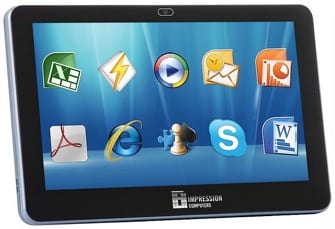Tablets are soaring in popularity, but which ones are right for the enterprise? Android, iOS or Windows? Consumer grade or Rugged? And why do businesses need tablets in the first place? Republished with permission from Field Technologies Online.
 Tablet computers are enjoying unprecedented popularity, thanks in part to the iPad and its countless Android imitators. However, one cannot disregard the influence of innumerable commercial enterprise, public safety operations, and military programs that have been utilizing Windows-based tablets for more than 20 years. Because of this, the tablet form factor will continue to show strong growth, not only with consumers, but also in the mobile enterprise market.
Tablet computers are enjoying unprecedented popularity, thanks in part to the iPad and its countless Android imitators. However, one cannot disregard the influence of innumerable commercial enterprise, public safety operations, and military programs that have been utilizing Windows-based tablets for more than 20 years. Because of this, the tablet form factor will continue to show strong growth, not only with consumers, but also in the mobile enterprise market.
That’s because mobile computing has evolved from a specialty item to an absolute requirement for productive, task-oriented, and customer-focused employees. As an increasing number of businesses deploy office applications to their mobile workforce, they realize that selecting the right computer to support the task is critical to the goal of putting the right person in the right place at the right time with the right information. This objective requires mobile computing that incorporates advanced communications technology, effectively interfaces with an array of remotely accessible company systems in support of the mobile work, and withstands harsh environments and rough treatment.
Tablet PC Growth Factors
The anticipated increase in the deployment of tablets is based on several factors that are common to the tablet form factor in general. Other growth factors relate specifically to the rugged sector of the market where conditions determine the correct balance of portability and functionality.
The most obvious characteristic that sets tablets apart is the lack of a physical keypad for data input. However, the widespread nature of smartphone technology means users are now accustomed to tough-screen technology to operate applications and perform functions like data entry and retrieval. Further, developers are skilled at writing applications to incorporate these faster, more efficient user interfaces.
From an operational perspective, a standing worker can easily use a tablet while holding it in one hand, whereas using a notebook computer requires that it be placed on a surface for keyboard utilization. Tablets are compact and take up less space when mounted in a vehicle. And they offer a display size that works best for mobile employees. Handheld devices like smartphones provide a high degree of portability, but their displays are often too small for efficient field operations or for presenting complex information to the mobile worker.
The Case For Rugged Tablets
 In addition to their resistance to water, dust, shock, and vibration, rugged tablets are designed for the type of work performed by mobile employees. Generally speaking, these employees are dispatched to the field to perform specific tasks, and will often run only one application at a time. Performing these assigned tasks is facilitated by an array of communications tools, including access to broadband Internet, Wi-Fi service, Bluetooth connections for peripherals, and global positioning. These integrated systems are designed to function in rugged environments and adverse conditions.
In addition to their resistance to water, dust, shock, and vibration, rugged tablets are designed for the type of work performed by mobile employees. Generally speaking, these employees are dispatched to the field to perform specific tasks, and will often run only one application at a time. Performing these assigned tasks is facilitated by an array of communications tools, including access to broadband Internet, Wi-Fi service, Bluetooth connections for peripherals, and global positioning. These integrated systems are designed to function in rugged environments and adverse conditions.
To read the rest of this article, including how tablet computers can increase revenues for your business, go to Field Technologies Online (subscription required).


Share this: